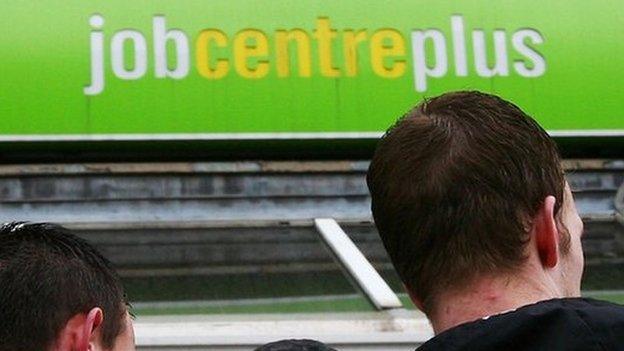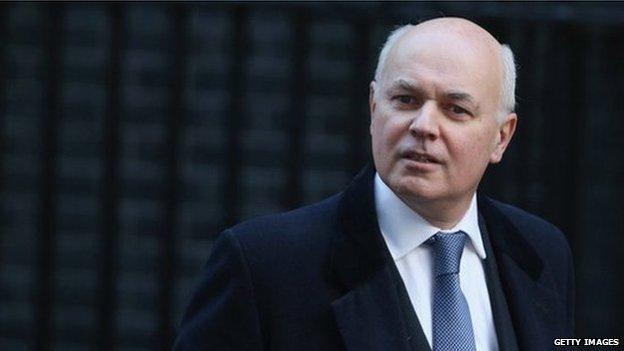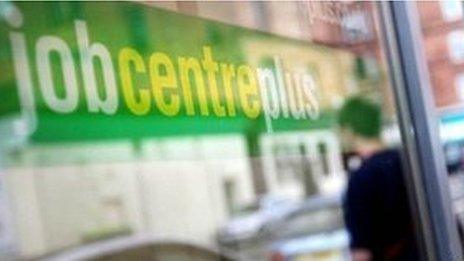'Flawed' Work Programme contracts costing millions, watchdog says
- Published

The Work Programme was launched in 2011
Tens of millions of pounds could be paid in bonuses to underperforming contractors responsible for the government's flagship back-to-work scheme, a watchdog has warned.
Flaws in contracts mean the Department for Work and Pensions (DWP) has to pay incentives for the Work Programme to even the worst-performing providers, the National Audit Office (NAO) said.
The bill for such bonuses is likely to reach £31m in 2014-15, it added.
The DWP disputes the report's figures.
It said no bonuses had been paid to Work Programme providers, and any future "incentive payments" - which would not be due for another year - would be part of negotiating improved contract performance.
Unusually, the report, external was not signed off by the DWP, which is led by secretary of state Iain Duncan Smith, before publication on the grounds that it did not reflect its view of the "relevant facts".
The programme was launched in 2011 with the aim of helping 2.1 million people by March 2016.
It is being run by 18 "prime contractors", which are providing support and training to people on jobseeker's allowance (JSA) and employment and support allowance (ESA) and being remunerated on the basis of the number of people finding and staying in work.
The NAO said the programme had "improved after a poor start" and could potentially offer value for money over the long term. It said half a million people had been placed in a job while nearly 300,000 were still in work after six months.
But it raised concerns, saying problems with contracts and performance benchmarks had led to "unnecessary" costs.

Ministers, led by Work and Pensions Secretary Iain Duncan Smith, say the scheme is more cost-effective than others in the past
It suggested firms may have received £11m between June 2011 and May 2014 "for performance they may not actually have achieved".
The amount of overpayments could rise to £25m, it warned.
It suggested the system put in place to keep track of workers - with contractors expected to contact employers 27 times during a two-year period - was delivering patchy results, with some employers not bothering to return calls.
And it warned that the system for rewarding suppliers for good performance - based on the number of people finding work as a proportion of the number of people joining the programme - was flawed.
While firms should be receiving £6m in bonuses this year, they were actually likely to receive £31m.
Different groups
The watchdog acknowledged steps had been taken to control costs, with payments between June 2011 and March 2014 set to be £300m less than first thought. It also said the Work Programme was likely to be more cost-effective than its predecessors.
Ministers expect the entire programme to yield £450m in savings by reducing the benefits bill, but the watchdog warned that there was a marked difference in performance between different groups.
Of JSA claimants aged over 25, 27% of those who had completed the programme found work lasting six months or longer.
The watchdog said this performance was in line with previous comparable schemes, although lower than the 39% success rate forecast by ministers when the programme started and the 33% set minimum performance level.
And it said the record of helping people facing the greatest barriers to finding work had fallen "well short" of the government's expectations, with 89% of ESA claimants remaining out of work after six months.
'Mountain to climb'
Amyas Morse, the head of the NAO, said there were signs of improvement, adding: "The department must now deliver the significant increases in performance it expects, in particular improving outcomes for harder-to-help groups."
Labour MP Margaret Hodge, chairwoman of the Commons Public Accounts Committee, said it had a "mountain to climb" to help those most in need of support.
"It beggars belief that the department expects to pay at least £31m in bonuses to all of its contractors despite their poor performance," she said.
The Department for Work and Pensions said the £11m in overpayments accounted for less than 1% of total payments and verification procedures were "more robust" than previous employment schemes. It also insisted that no bonuses would be paid this year.
A spokeswoman said: "Even starting in the recession, the Work Programme performed as well as previous schemes, and with performance improving rapidly it is on track to deliver significantly more jobs than previous schemes."
Suppliers to the Work Programme, which include companies and charities, said they had increased support for the most vulnerable participants.
"Work Programme providers are spending on average 60% more on ESA jobseekers than the NAO report claims," said Kirsty McHugh, chief executive of the Employment Related Services Association.
"This is why performance here is improving, albeit more slowly as many of these jobseekers are a long way from the labour market."
- Published26 September 2013

- Published27 June 2013

- Published21 March 2013
